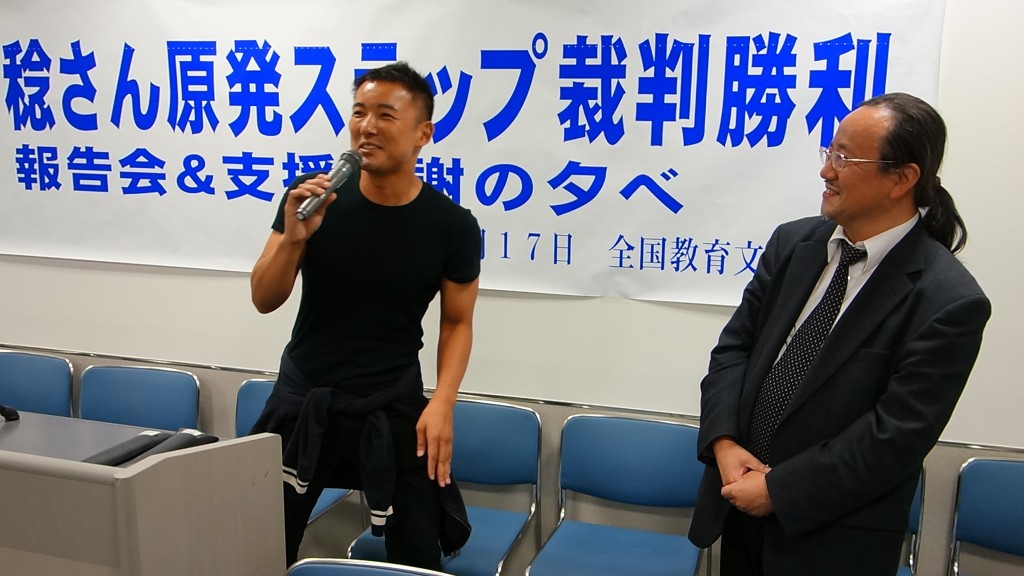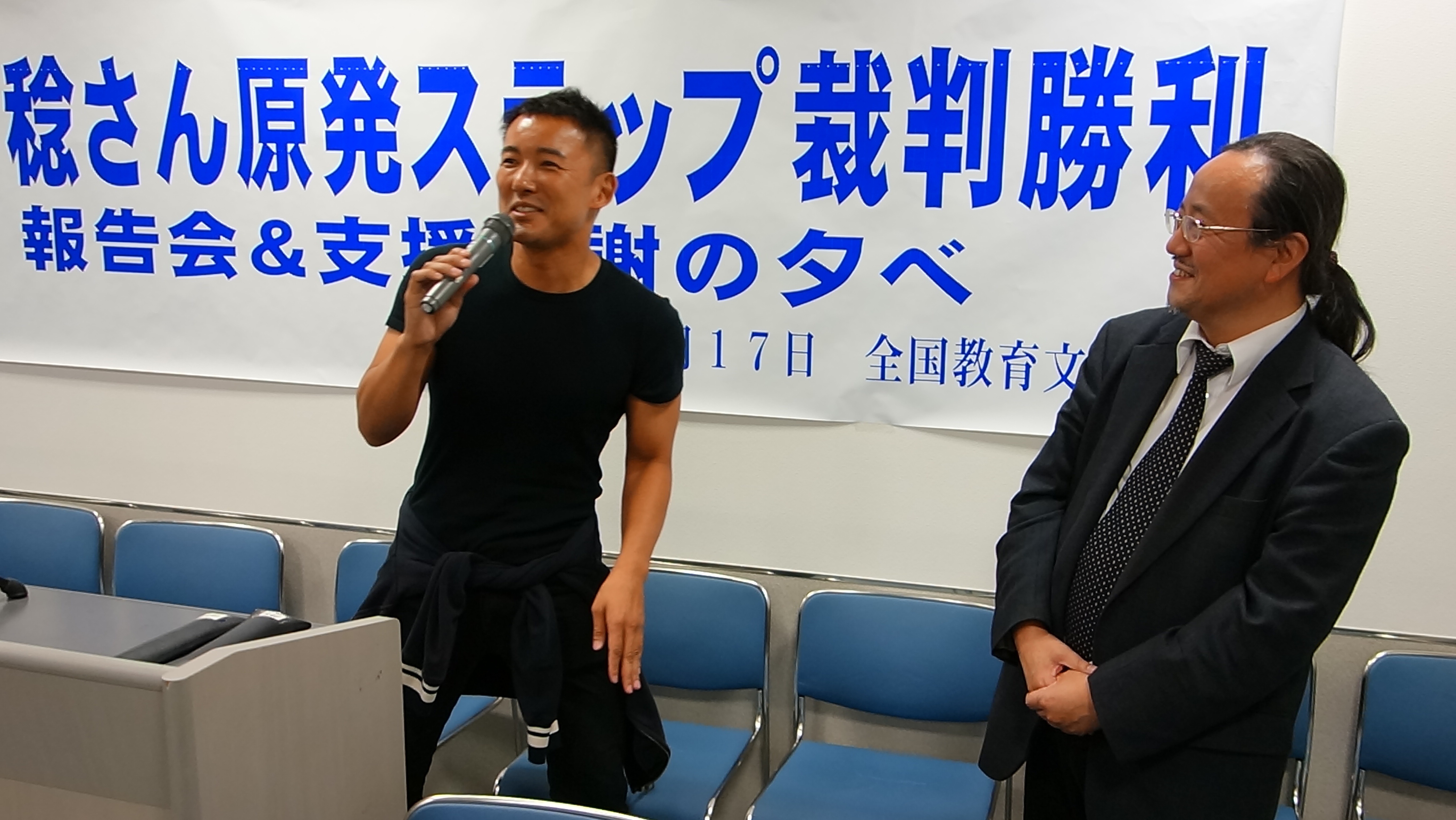The tale of Tanaka Minoru, the journalist who took on a much feared kingpin in Japan’s nuclear industry, Shiro Shirakawa, and who was sued for nearly $670,000, ended happily. Mr. Shirakawa folded. Mr. Tanaka and his supporters celebrated his semi-victory last week.
The lawsuit was officially dropped in August but the party was a long time in coming. Although with new legislation on the horizon to darken the changing landscape of freedom of the press here, the celebration was very short.

Last week, on October 18th, more than 50 people with different backgrounds: reporters, editors, politicians, singers and actors gathered in the basement of a Tokyo building to celebrate the rare victory of a journalist against a SLAPP (Strategic Lawsuits Against Public Participation) lawsuit. Strategic Lawsuits Against Public Participation (SLAPP) are designed to censor and silence individual reporters or independent media by forcing them to pay the cost of a legal defense; by doing so- it ruins them financially. These kind of lawsuits are penalized in California and many places in the United States but in Japan, there is no legal protection. The journalist or media outlet who is sued loses (financially), even if they win in court.
All those present at Minoru Tanaka’s victory celebration were people concerned about freedom of the press, and the very essence of democracy, now in danger in Japan as a new secrecy bill is about to pass.
Minoru Tanaka’s story is the story of one man, one journalist. He was sued in 2012 for a story he wrote about a shadowy figure in the Japanese nuclear industrial complex, also sometimes called the nuclear mob (原発マフィア). The plaintiff found the story embarrassing and of course, as always in these cases, he had the financial power and luxury to launch a legal assault on the lone reporter.
In his article published on December 16th, 2011 in Weekly Friday (週刊金曜日), Mr. Tanaka, who has long been investigating and reporting the shady side of Japan’s so-called Nuclear Village also known as the Nuclear Mafia (原発マフィア), focussed on one kingpin. There are few reporters who have a better sense of the complicated relations between politicians, electric power companies, media tycoons, advertisement agencies, construction companies and of course, the Japanese police and the Japanese mafia. The reward for his magnum opus was being sued for a total of 67,000,000 yen by one of Japan’s most powerful nuclear industry businessmen, Shiro Shirakawa, for damage and defamation. Mr. Shirakawa, a former secretary to LDP Diet member and power broker, Hiroshi Mitsuka, is well-connected and has great influence in Japanese society.
It was the first time in Japan that a journalist was sued individually for an article he wrote, but not the magazine that published it. Minoru Tanaka is a hero for some of his supporters. He says he simply did his job as an investigative reporter and was punished for revealing the truth to the public.
Tanaka researched, perhaps too deeply, into the ties that connected Shiro Shirakawa, the plaintiff, to Hiroshi Arakawa, former chairman of TEPCO and also Shirakawa’s alleged links to member of organized crime, the yakuza. Shirakawa, is also the president of New Tech, a company that offers security services to nuclear power facilities. He was reportedly suspected of asking help to gangsters to stop the publication of certain materials and diverting huge profits made in land transactions to politicians. Tanaka’s article also revealed the connections between Shirakawa and Diet member Kamei Shizuka as well as a former high-ranking police official. Shirakawa has also allegedly made death threats to newspapers who interviewed him, resulting in his name often being dropped from articles and the letter “S” being used instead of his name.
Tanaka was lucky to get the article published. Unlike the salaryman reporters at the gigantic Japanese media outlets, he didn’t have to hit his head against the wall of top editors and media tycoons higher in the media hierarchy, who are themselves connected to the nuclear industry and the ruling politicians. However, as a a freelance reporter, he was unlucky that he didn’t have a huge newspaper to pay his legal expenses either.
“SLAPP are made to destroy your every day life. You can’t work anymore. Every morning when I woke up I had the number 67 million yen floating over my head. It was hell. I couldn’t focus,” Minoru Tanaka said at a speech during the celebration party.
Many attending first apologized for not being able to support Mr. Tanaka the way they wished. Reporters from the mainstream media were afraid to get the same treatment by following up on Tanaka’s report. “I was afraid to be individually sued, like Mr. Tanaka was,” said one reporter from a major Japanese newspaper. Another said, “Shirakawa has a lot of connections and a lot of power. Even writing about the lawsuit could have opened a Pandora’s Box. My editor said just to wait for the verdict.”
While the relieved group was drinking and celebrating, some supporters of freedom of the press within the National Diet, such as Taro Yamamoto, a handsome actor and politician recently elected to the House of Councilors, gave a speech in support of Mr. Tanaka and pointed out the looming danger for Japan’s democracy. “I admire reporters like Tanaka and I am sincerely happy for his victory today. But the Abe administration is now planning to submit a new secrecy bill (Secrets Protection Act) to the Diet to enforce national security. Freedom of information and freedom of the press, the two main pillars of Democracy are jeopardized.”
Civil servants as well as journalists could face up to 10 years in jail if they reported national secrets under the proposed law. Although all countries have legislation for national security—classified information—it is questionable why Japan is changing its law now. The DPJ-led government began to contemplate such a law after a video taken by a Japanese Coast Guard official showing the attack of a Chinese fishing boat against Japanese coast guard boat near the Senkaku Islands was leaked in September 2010. The official line was that it was a collision and not that the Chinese fishing boat was the aggressor. The case also illustrated the perils of protecting sources in Japan and the difficulty of officials speaking to the press.
In the case above a Coast Guard officer who leaked footage of a Chinese “fishing vessel” attacking or ramming into a Japanese Coast boat, was under a criminal investigation for a violation of the laws mentioned above. The officer released the footage out of good conscience, because he felt the Japanese public wasn’t getting the true story of what happened because the Japanese government was kowtowing to China. He even reportedly sent a copy of the video to CNN on a memory stick, but CNN didn’t examine the data or choose to ignore it.
For releasing the video, the Coast Guard officer was put under criminal investigation. It was only because of massive public support and sympathy that the case was dropped. Technically, it’s illegal to share any secrets or information that a public servant has access to in the course of this work. This law applies to police officers and all government employees. Violators of the law, those who have talked to the press on the record, or off the record, and then been exposed—have been fired, prosecuted or both.
The U.S. reportedly urged Japan to pass such law to protect information related to national security, defense, diplomacy, counter-intelligence and counter-terrorism. However, judging by past history, the law will most likely be used to muzzle any whistle-blowers, or the release of information that might embarrass Japanese politicians or Japan. Mr. Tanaka’s next quest is to work with other journalists to make sure that SLAPP actions are aggressively slapped down and that new laws don’t infringe on Japan’s freedom of press.
Unfortunately, the lawsuit against Mr. Tanaka and the contents of his article have been more or less ignored by the mainstream Japanese press. Freedom of the press exists in Japan but in reality, many media groups shy away from using that freedom; they remain caged in a box of their own fears and lack of resolve.

A great story, but the article itself is in badly need of an editor.
Yep, I edited it on almost no sleep. Re-edited. Thanks!
Who controls the media outlets in JP?
The biggest advertisers and organizations that scare the hell out of the mass media.
Amazing story
Glad to see Mr. Tanaka won. I hope this story will encourage positive changes in the way the way corporate Japan, the Japanese press and the Japanese legal system operate (though I don’t have high hopes). The kind of harassment he experienced in being sued for doing the right thing, is not uncommon in Japan. I was sued in a Japanese court as well.
Here is the story: http://donmaclaren.com/my_life_in_corporate_japan.html